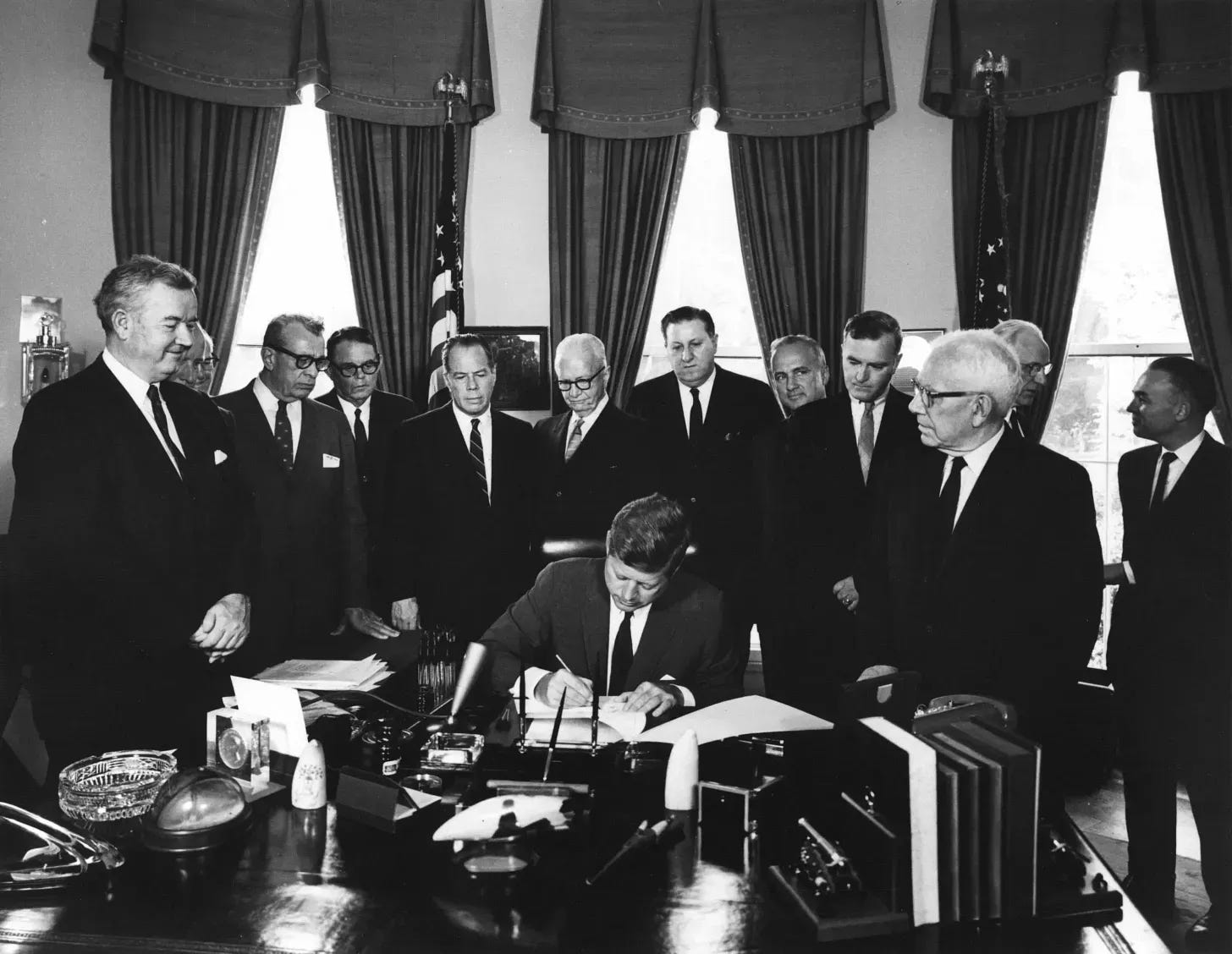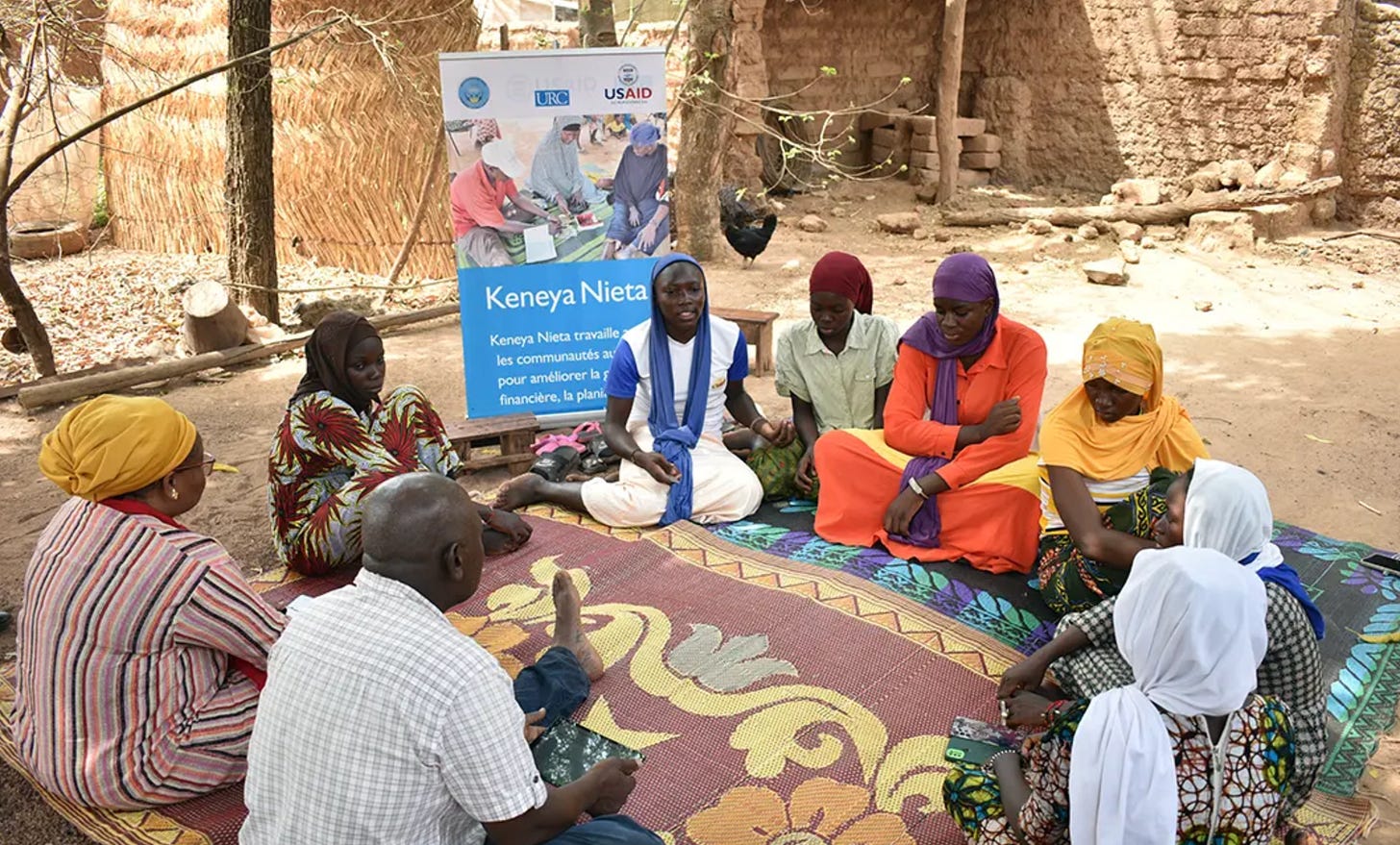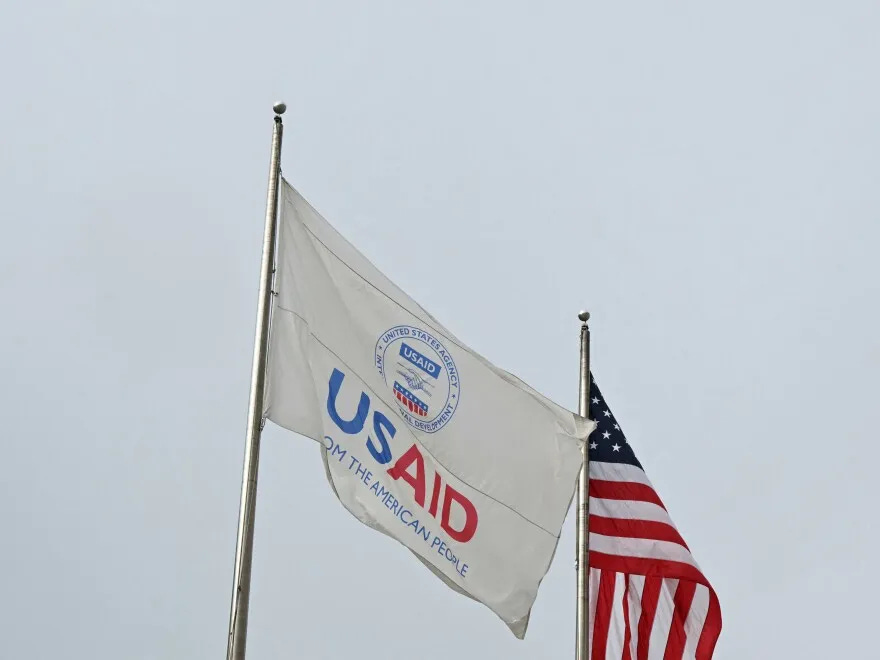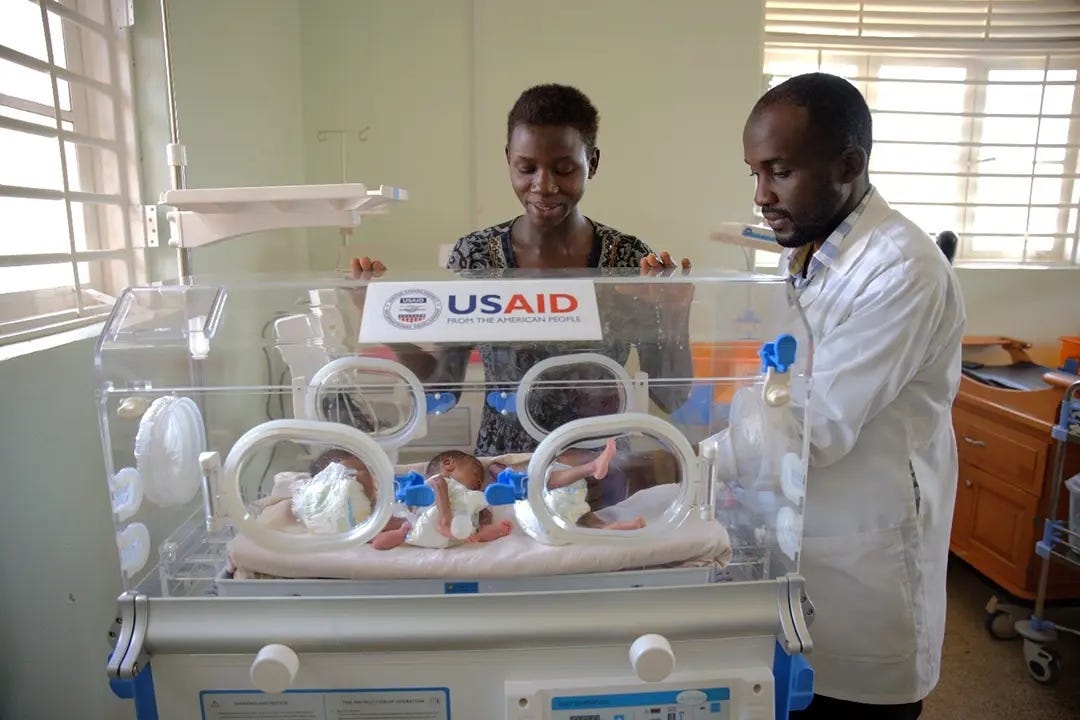On Foreign Assistance
Foreign assistance has been integral to U.S. foreign policy in Africa. Did we stray too far?
When I served as President Biden’s Senior Director for African Affairs at the National Security Council, I had more than a few difficult meetings over whether, and how, to cut foreign assistance. The toughest calls weren’t about coup d’etats; those restrictions were dictated by law. The real discomfort came from withholding foreign aid due to policy choices—either related to geopolitics (Mali) or values (Uganda). The deliberations were painful. Do we cut programs, cancel market access, or shift funds elsewhere? Each choice risked hurting people more than governments. And that’s what was unsettling: I agreed with the policy goals, but the collateral damage was undesirable and unwanted.
I’ve been thinking a lot about these wrenching decisions in recent months. Of course, I have been distraught by how the Trump administration shut down most of our foreign assistance programs. But it also has prompted me to reflect on the shortcomings of foreign aid in Africa.
Kennedy’s Vision
Before I say anything further, I should offer a caveat: I am not a development expert. There are so many people who are more informed than me and have dedicated their careers to this work. That said, I have spent more than two decades involved in U.S.-Africa policy, both supporting senior U.S. Agency for International Development (USAID) officials and serving as a decisionmaker myself. Plus, as readers may know, I have been long obsessed with President John F. Kennedy’s approach to Africa, including his vision for foreign assistance.
In March 1961, Kennedy laid out three arguments in support of authorizing a new aid agency:
Humanitarian: Kennedy called it “our moral obligations as a wise leader and good neighbor in the interdependent community of nations.” He pointed to our responsibility as the wealthiest people in a world of largely poor people.
National Security: Kennedy stressed that a failure to meet these obligations would be “disastrous to our national security, harmful to our comparative prosperity, and offensive to our conscience.” He warned that widespread poverty and chaos would endanger U.S. security and imperil U.S. prosperity.
Geopolitical Competition: Kennedy added that the “fundamental task is to help make a historical demonstration in the twentieth century, as in the nineteenth – in the south half of globe as in the north – economic growth and political democracy can develop hand in hand.” It was an answer to what he saw as the Soviet Union’s use of its assistance to gain footholds in the developing world.
Foreign assistance, in other words, was never just about aid. It was a tool of foreign policy. Yes, we rushed to help in crises. Yes, we pushed for development outcomes and economic growth. But aid (although not necessarily life-saving humanitarian assistance) was also about leverage: we offered it to pull partners closer, withheld it to push them toward change.

In Dialogue with Africans
Kennedy was explicit that the U.S. government must work in lockstep with its foreign partners, directing assistance to meet targets that “developing nations set for themselves.” It was work to be done largely with governments in support of their goals, not with non-government entities in pursuit of an imposed U.S. agenda.
Kennedy leaned in, often overruling the U.S. and international bureaucrats who thought they knew better. He insisted that this effort had to succeed because “the eyes of our adversaries [are] awaiting the weakening of our resolve in this new area of international struggle.” It became a model that he and his successors generally followed for decades—fashioning U.S. assistance to meet African goals without losing sight of geopolitics or abandoning our values.
Kennedy backed Ghana’s Volta River Dam project, which was vital to Ghanaian leader Kwame Nkrumah’s development agenda. Kennedy even weighed in with the World Bank, because, according to a State Department memo, to “rebuff the Ghanaians by denying them Western assistance in their struggling efforts to develop a modern and economically sound state and improve the lot of their people would not only risk driving them into the Soviet camp but would have far-reaching implications for Africa as a whole.”
President Richard Nixon, in 1969, similarly supported a loan for an irrigation scheme in Sudan, a priority for the new military government. A declassified CIA assessment warned that Sudan may turn to the USSR for assistance if the International Bank for Reconstruction and Development did not provide financing for the project. A retired USAID officer later claimed the project became a cornerstone of the U.S. relationship with Sudan; he recalled that he was treated like royalty when Sudanese learned he was assigned to work on the project.
A few years later in Uganda, Nixon closed the U.S. Embassy and phased out technical assistance to the Ugandan government. A USAID mission director explained that U.S. foreign assistance in Uganda, including in the agricultural, education, and health sectors, was “leverage to apply pressure to the government.” Nixon’s decision stemmed from Idi Amin’s gross human rights abuses and his anti-U.S. foreign policy positions on Vietnam and Israel, as well as increasing security threats to U.S. persons.
In each of these examples, the provision or retraction of U.S. foreign assistance served to support multiple goals. It responded to African agendas, advanced U.S. geopolitical objectives, and reflected U.S. values. It was a dialogue between the U.S. government and its African counterparts.
A Post-Cold War Pivot
Kennedy’s approach, however, was eventually downplayed and deemphasized. This shift had several significant policy implications. Due to the end of the Cold War, foreign assistance increasingly became focused on democratic reforms in the 1990s and building human capital in the 2000s, including addressing the scourge of HIV/AIDS, malaria, and TB. And, because of U.S. concerns about African corruption and demands for more accountability, as well as domestic incentives to support U.S. contractors (often derided as “Beltway Bandits”), the U.S. government ended most of its direct support to African states. In fact, the Congressional Research Service in 2023 reported that government-to-government assistance had come to represent only a small fraction of total U.S. assistance to Africa.
Don’t misunderstand me. In the intervening years, there have been massive improvements in all categories: infant mortality, incidence of HIV, access to electricity and basic services, primary school enrollment, and GDP per capita, judging from the World Bank statistics on sub-Saharan Africa. Globally, Charles Kenny and Justin Sandefur have estimated that the number of lives saved from U.S. foreign assistance, including humanitarian relief, may range between 2.3 to 5.6 million per year.
That being said, I have been interested in a different set of questions. Namely, what was lost by this shift in approach? What were the implications for African objectives and U.S. policy tools?
Hidden Costs (to African States)
The most consequential outcome of these changes to U.S. foreign assistance has been the shrinking of the African state. With foreign aid flowing into pockets of local NGOs and U.S. contractors, African governments became weaker and often less capable — bystanders in their own country’s development. As the recipients of foreign assistance shifted from governments to non-government entities, a parallel state started to emerge. In many cases, we inadvertently outsourced essential government services to non-governmental organizations. The state receded, becoming less responsible for the betterment of its citizens and less accountable to its voters.
That’s why the dismantling of AID hasn’t been as widely condemned by African governments and intellectuals as it has in U.S. national security and development circles. African leaders, arguably for pragmatic reasons, have welcomed the decision, pointing to the limitations of foreign assistance.
Zambian President Hakainde Hichilema exclaimed: “It is long overdue, it is actually long overdue because it underscores the importance of us on the continent growing our economies, focusing on growth, growth, and more growth.”
Rwandan President Paul Kagame acknowledged that “African countries need to learn to be self-sufficient.” He added that “It’s an aid thing which I’ve never been a friend of it, much as I’ve been a beneficiary of it.”
African intellectuals have been more incisive in their criticism. Ebenezer Obadare remarked that the “continued reliance on foreign aid in fact puts the continent in jeopardy.” Zainab Usman argued that “if one sees aid as an industry, then rich countries appear as sellers and poor ones as buyers.” On the High Energy Planet podcast, Ken Opalo explained that foreign assistance had disincentivized governments from developing functioning systems to ensure, for example, that women are getting screened for prenatal care or governments maintain a fleet of ambulances. In his must-read substack, The Africanist, Opalo is even more blunt:
Aid dependency is bad. The loss of policy autonomy by aid-dependent governments is bad. The erosion of government legitimacy and accountability mechanisms that happens under conditions of severe aid dependency is bad. The fact that too often aid projects are poorly designed by people who pay little attention to contexts and don’t care to consult would-be beneficiaries is bad. The distortion of labor markets and policy focus that due to aid dependency is bad. The humiliating loss of dignity that comes with being perennially dependent on charity from strangers is bad.
Hidden Costs (to U.S. Policy)
Meanwhile, I had to grapple with another consequence of the shifting tides of U.S. foreign assistance. By directing almost all foreign assistance to NGOs and U.S. entities, we stepped back from a dialogue with African governments. In other words, we lost our leverage.
If we wanted to reward a government for specific actions, we had fairly limited options. We could increase funding for existing programs and maybe seek to induce more private sector investment—nice for a factsheet but underwhelming in practice. Indeed, most of our foreign assistance was indirect and not very legible to our partners. It was not uncommon for an African official to ask me where all the money actually went and question whether it was aligned with their government’s agenda. To be sure, U.S. foreign assistance benefited many Africans, but it had lost its relevance for many African governments.
The situation was even more complicated when we had a disagreement. There wasn’t much we could take away in those scenarios. We were stuck with ending programs that we saw as in our interest—cutting off our nose to spite our face. I remember having an argument with a USAID counterpart about shifting some funds in the Sahel. It was a miserable exercise. The programs on the chopping block seemed admirable in principle, but they probably didn’t matter too much to the targeted government which had been uninvolved in its design and implementation. In other words, it was unlikely to have much of a sustainable impact on our bilateral relationships because almost all our programming existed separately from African governments.

When Assistance Returns
I remain optimistic that foreign assistance will be resurrected at some point by a future U.S. administration. Like many other pundits, though, I believe we must do it differently. I am open to debate what sectors are more important than others (and life-saving assistance should be in a category of its own), but I think Kennedy fundamentally got it right. Unfortunately, we just veered too sharply from the path. U.S. assistance should reflect our national security priorities and our values. It must be seen as a tool of foreign policy, not something that lives apart from our engagement with African governments.
When we resume foreign aid, we should return to working closely with foreign governments, including providing direct budgetary support. As my African friends have argued, I believe our assistance has to build government capacity. I strongly concur with former Liberian Minister of Public Works Gyude Moore who has argued that African governments need to be “significantly more assertive,” rejecting out of hand undesirable and unworkable foreign assistance programs. Kennedy would have agreed with these recommendations. He wanted the United States to help build systems with an eye toward a future where less developed nations “will no longer have to depend on outside assistance.”
There are several approaches we could consider to meet such a goal while guarding against waste, fraud, and corruption. For instance, we could negotiate agreements for matching funds, requiring the recipient government to invest a small amount of its own money to unlock U.S. assistance. In the Stanford Social Innovation Review, Kevin Starr advanced a similar concept, arguing “we need a whole new approach toward helping governments achieve their ends in their way. Doers should be partners in joint ventures where they use philanthropic money to make stuff happen that the government will do and pay for.” I’d also posit that U.S. programming should have a clear end date. If foreign assistance is presented as an open-ended commitment, we will once again sow the seeds of aid dependency.
Finally, if we detect graft or disagree on foreign policy, we should be able to dial down our assistance without hurting African publics. Under those circumstances, if possible, we should shift our funding to non-governmental implementing partners (which happened to a small degree in Uganda). We can’t return to a situation where we impose costs at the expense of U.S. interests and African aspirations.
Post Strategy
There’s more to say on foreign assistance, including humanitarian aid, in future posts. I certainly don’t have all the answers, but I do think it is incumbent upon us all to continue to think out loud about this issue. From my experience, our assistance has become less and less about engagement with foreign governments, which has been to the detriment of African agendas and U.S. policy goals. At minimum, that’s one thing that we should change.





Very revealing. Thanks for the candour and insight. Great to see the perspectives of African leaders, as well as US.
Thought-provoking post, Judd. From a European perspective, you are half right. Aid policy has moved in cycles. There was a 15-year cycle (2000-2015) during which UK and European aid was deliberately channelled through African governments as budget support with as little conditionality on how it was used except at the macro-level on both governance and economic policy. It supported states; it provided leverage; it delivered results. But it did not last. Why that was so deserves a longer article, which is important to answer the question, what aid, if any, is still needed.